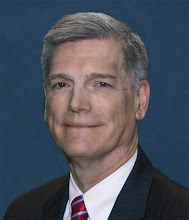 |
| Tony Alexander |
The full text of Mr. Alexander's speech is available from FirstEnergy. A video recording of Mr. Alexander's speech is available on the Chamber web site. His remarks begin at 1:03:43 in the recording. Introductory comments of Senators Rob Portman (R-OH) and Joe Manchin (D-WV) precede Mr. Alexander's remarks. The Chamber's blog post also provides some highlights.
Among the key points that struck us as significant were the following:
- Germany offers a vivid picture of what lies ahead if U.S. policies continue. There electricity prices have doubled to more than 37 cents per kilowatt-hour, as compared with a U.S. average of 10 cents per kwh.
- As government mandates and subsidies drive renewables into the market, our electric system is relying more on intermittent sources of generation, such as wind and solar. These resources require back-up generation and substantial investments in transmission (i.e., hidden costs) to maintain reliability.
- Production tax credits and other subsidies encourage developers to build new capacity whether or not the output is needed. This unneeded capacity puts additional pressure on baseload coal and nuclear assets that are essential to grid stability and affordable energy prices.
- In competitive electricity markets, if market rules don't change to reflect the true value of baseload generation, additional coal and nuclear units may be shut down.
- While the supply of natural gas today is abundant, substantial changes will be needed in the natural gas pipeline and storage infrastructure to make it match the just-in-time nature of the electric system. That is a long way off.
- With its current approach to electricity markets, government is, in effect, using private sector balance sheets to pay for social policies.

Comments
That said, I want to continue arguing with all of us, that we are picking the wrong 'winner'. What we should be doing is encouraging the development of nuclear power. And, in particular ways to make it cheaper, and not more expensive.
Although Germany may be making it hard for themselves to compete with us, we are going to have the same trouble with China as they develop the next generation of advanced nuclear technologies.
I don't know if this was widely noticed, but China began construction last week of their CAP1400 the larger-scale variant of the Westinghouse AP1000, with 80% local content and freedom from IP constraints.
They are not sitting on their hands. Although this is a traditional PWR it represents the state of the art for that technology and China is also looking at fast liquid metal breeders, molten-salt reactors, and high-T gas reactors.
Government should just plain internalize the cost of greenhouse gas emissions (CO2, but also CH4, CF4, SF6, NF3 and a host of others). All PTCs, ITCs and other promotions not yet paid out should be eliminated with all due speed. Rebate the taxes on personal tax returns and then get out of the way.